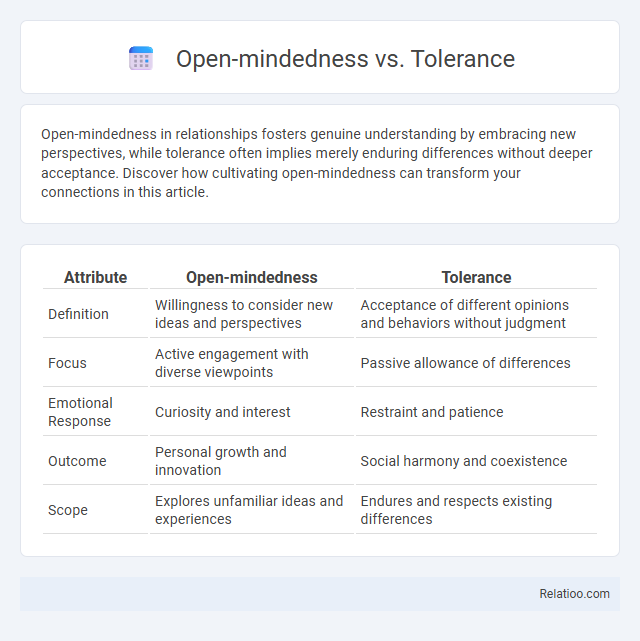Open-mindedness in relationships fosters genuine understanding by embracing new perspectives, while tolerance often implies merely enduring differences without deeper acceptance. Discover how cultivating open-mindedness can transform your connections in this article.
Table of Comparison
| Attribute | Open-mindedness | Tolerance |
|---|---|---|
| Definition | Willingness to consider new ideas and perspectives | Acceptance of different opinions and behaviors without judgment |
| Focus | Active engagement with diverse viewpoints | Passive allowance of differences |
| Emotional Response | Curiosity and interest | Restraint and patience |
| Outcome | Personal growth and innovation | Social harmony and coexistence |
| Scope | Explores unfamiliar ideas and experiences | Endures and respects existing differences |
Understanding Open-mindedness: A Core Definition
Open-mindedness is the cognitive willingness to consider new ideas, perspectives, and evidence without prejudice, distinguishing it from tolerance, which primarily involves enduring differences without necessarily embracing them. Your ability to practice open-mindedness enhances critical thinking and empathy, fostering genuine understanding beyond mere acceptance. Emphasizing open-mindedness as a core attribute unlocks deeper social connection and intellectual growth.
Defining Tolerance: What Does It Really Mean?
Tolerance refers to the willingness to accept and respect differences in opinions, beliefs, and behaviors without necessarily agreeing with them. It involves enduring or permitting ideas or practices that one may find objectionable, promoting coexistence in diverse societies. Unlike open-mindedness, which actively seeks to understand and evaluate new perspectives, tolerance primarily emphasizes patience and non-interference with differing views.
Open-mindedness vs Tolerance: Key Differences
Open-mindedness involves actively seeking and considering new ideas without bias, while tolerance is the acceptance of differing opinions or behaviors without necessarily agreeing with them. Your ability to engage critically and empathetically with diverse perspectives defines open-mindedness, whereas tolerance centers on coexisting peacefully despite disagreements. Understanding these distinctions enhances communication and fosters respectful relationships across varied viewpoints.
The Roots of Open-mindedness in Human Behavior
The roots of open-mindedness in human behavior stem from cognitive flexibility and a willingness to consider diverse perspectives, which fosters intellectual growth and empathy. Tolerance involves accepting differences without necessarily understanding them, while open-mindedness requires active engagement and evaluation of new ideas. Your ability to cultivate open-mindedness influences social adaptability and critical thinking, essential for navigating complex social environments.
The Limits of Tolerance in Diverse Societies
In diverse societies, the limits of tolerance become apparent when accommodating intolerant beliefs threatens social cohesion and democratic values. Open-mindedness requires not only accepting different perspectives but also critically evaluating harmful ideologies that undermine inclusivity. Balancing tolerance with safeguarding human rights ensures that diversity fosters respect without enabling discrimination or extremism.
Open-mindedness and Personal Growth
Open-mindedness drives personal growth by encouraging you to explore diverse perspectives and challenge existing beliefs, fostering intellectual flexibility and emotional resilience. Unlike tolerance, which implies passive acceptance of differing views, open-mindedness actively seeks understanding and integration of new ideas, leading to meaningful self-improvement and expanded worldviews. Cultivating open-mindedness enhances critical thinking skills and promotes adaptive learning, essential components of personal and professional development.
Tolerance: Navigating Boundaries and Respect
Tolerance involves respecting diverse perspectives while maintaining clear personal boundaries, ensuring peaceful coexistence without requiring agreement or full acceptance. It emphasizes acknowledging differences and allowing others to express varied beliefs and behaviors within socially acceptable limits. Navigating these boundaries with respect fosters inclusive environments where diversity is managed thoughtfully, preventing conflict and promoting mutual understanding.
Why Open-mindedness Matters in Conflict Resolution
Open-mindedness matters in conflict resolution because it enables individuals to genuinely consider alternative perspectives, fostering mutual understanding and reducing biases that escalate disputes. Unlike tolerance, which often implies passive acceptance, open-mindedness drives active engagement with differing viewpoints, promoting collaborative problem-solving and innovation. Cultivating open-mindedness creates an environment where conflicting parties feel heard and valued, increasing the likelihood of sustainable, amicable solutions.
Challenges of Practicing Genuine Tolerance
Practicing genuine tolerance challenges your ability to respect diverse perspectives without compromising personal values, often requiring a balance between acceptance and critical evaluation. It demands emotional resilience to engage with opposing views without bias, overcoming inherent prejudices and cognitive dissonance. The difficulty lies in fostering open-mindedness while avoiding passive tolerance, which can lead to indifference instead of meaningful understanding.
Cultivating Both Open-mindedness and Tolerance in Daily Life
Cultivating both open-mindedness and tolerance in daily life enhances personal growth and social harmony by encouraging acceptance of diverse perspectives and respectful dialogue. Open-mindedness involves a willingness to consider new ideas without immediate judgment, while tolerance emphasizes respecting differences even when disagreement exists. Practicing mindfulness, actively listening, and engaging with diverse communities foster these qualities, leading to more inclusive environments and reduced conflicts.

Infographic: Open-mindedness vs Tolerance
 relatioo.com
relatioo.com